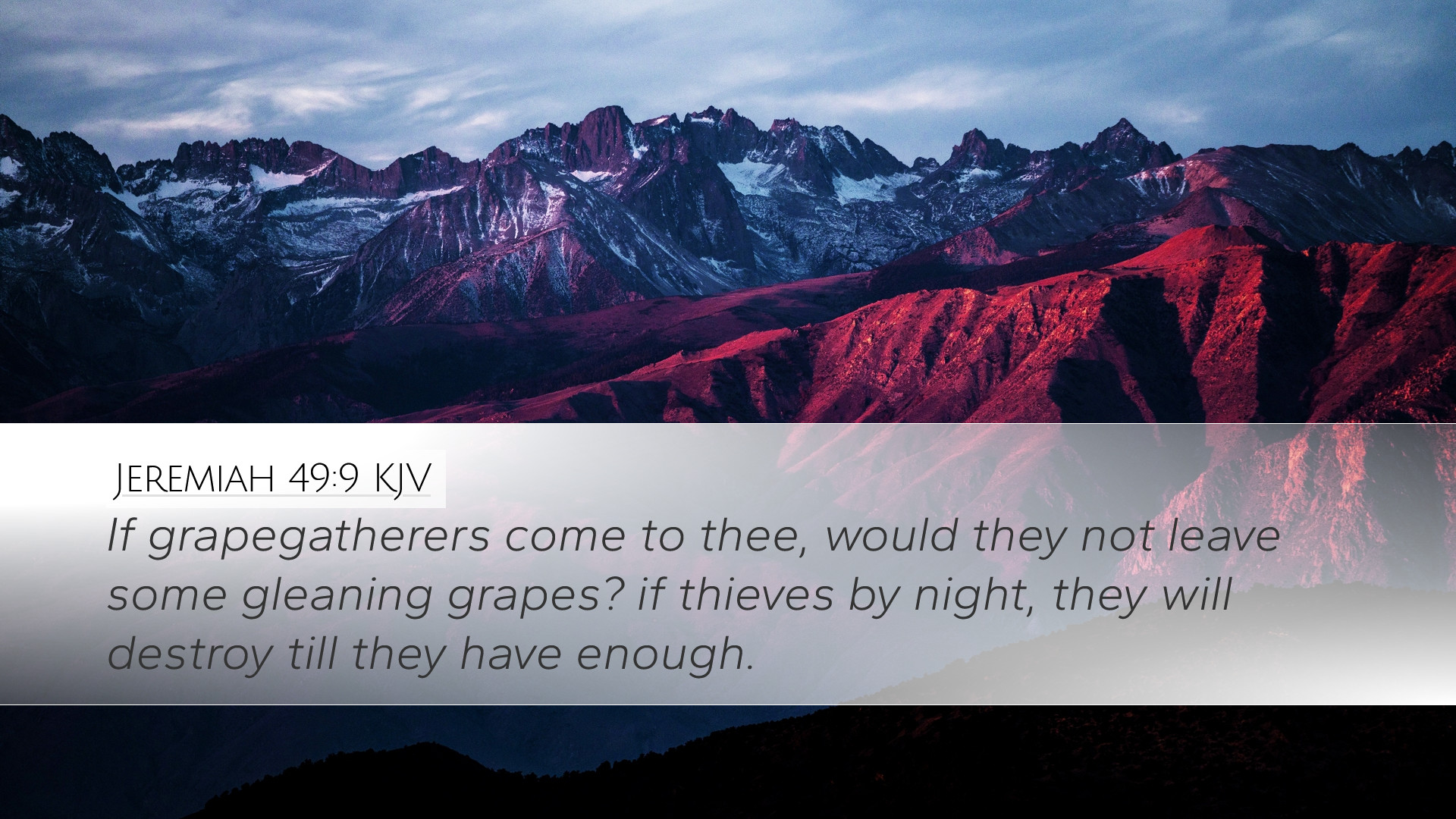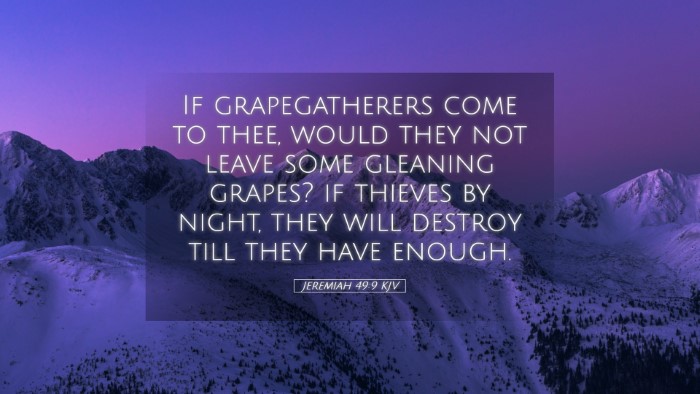Commentary on Jeremiah 49:9
Verse: "If grape gatherers come to thee, would they not leave some grapes? If thieves by night, they will destroy till they have enough." (Jeremiah 49:9, KJV)
Introduction
Jeremiah 49:9 is part of a broader collection of prophecies concerning the nations surrounding Israel, particularly the fate of Edom. This verse metaphorically employs the practices of grape gatherers and thieves to illustrate the thoroughness of impending judgment upon Edom. The insights from esteemed public domain commentators will provide depth to the exegetical understanding of this verse.
Contextual Background
The prophet Jeremiah, operating during a tumultuous period leading up to the Babylonian exile, stands as a voice of warning and hope. The nations surrounding Israel, including Edom, often harbored animosity towards Israel and celebrated its downfalls. Jeremiah speaks God's judgment specifically against these nations for their unrepentant actions.
Insights from Matthew Henry
Matthew Henry emphasizes the metaphorical nature of the verse, illustrating that just as grape gatherers do not take everything, leaving some grapes behind, neither does God act with total eradication. However, in the case of Edom, the prophecy indicates that they will be robbed entirely, indicating severe judgment. Edom’s sin and pride have incurred the wrath of God.
Henry highlights that God’s judgments are just and proportional to the sins committed. Edom, once proud and populous, will face desolation because of their actions against Israel. This serves as a reminder of the inevitable consequences of both individual and national sin.
Insights from Albert Barnes
Albert Barnes provides a literal interpretation, affirming that thieves take what they want but usually leave some remnants behind. In stark contrast, God's judgment on Edom will result in complete desolation. He posits that the totality of destruction foretells that Edom would not only face loss but an ultimate and irrevocable downfall.
- Thievery vs. Judgment: Barnes illustrates the distinction between human actions and divine judgment. Thieves are selective, but God’s judgment leaves nothing behind.
- God’s Sovereignty: The prophecy affirms God’s sovereign control over nations and highlights the moral order of the universe where divine retribution aligns with actions.
Insights from Adam Clarke
Adam Clarke expands on the sociopolitical implications of this prophecy, indicating the broader ramifications of Edom’s pride and animosity towards Israel. Clarke expounds on the fact that Edom represents a larger narrative of rebellion against God’s chosen people and ultimately, against God himself.
He notes that the complete destruction foretold signals God’s final judgment, indicating that even the most fortified nations would succumb to His will. Clarke emphasizes the spiritual lesson that the pride of nations blind them to their inevitable downfall, much like Edom who believed itself invincible.
Spiritual Significance
The spiritual truths drawn from Jeremiah 49:9 are profound. It serves as a cautionary tale to both individuals and nations about the consequences of pride, rebellion, and disregard for God’s commandments. The metaphor of grape gatherers and thieves encourages reflection on the nature of God's justice; while earthly judgments may come with limits, God's judgment is unfailing and complete.
This text challenges readers to examine their lives in light of humility, accountability, and repentance. Particularly for leaders and nations, it serves as a reminder that God’s sovereignty cannot be ignored without consequence.
Theological Implications
- Accountability: The text underscores the accountability that nations have before God, especially regarding their treatment of others.
- Judgment and Mercy: Though judgment is pronounced, it points to God’s overarching desire for repentance and restoration.
- Hope for the Oppressed: For the afflicted, God's judgment on Edom represents hope and vindication; the oppressed can trust in God's justice.
Conclusion
Jeremiah 49:9 serves as a powerful reminder of God’s justice, the serious consequences of pride, and the inescapable reality of divine sovereignty over nations. The insights from Matthew Henry, Albert Barnes, and Adam Clarke enrich our understanding of this verse, providing layers of meaning that resonate with theologians, pastors, and students alike. It calls for introspection and humility in the face of God’s infinite wisdom and judgment.


